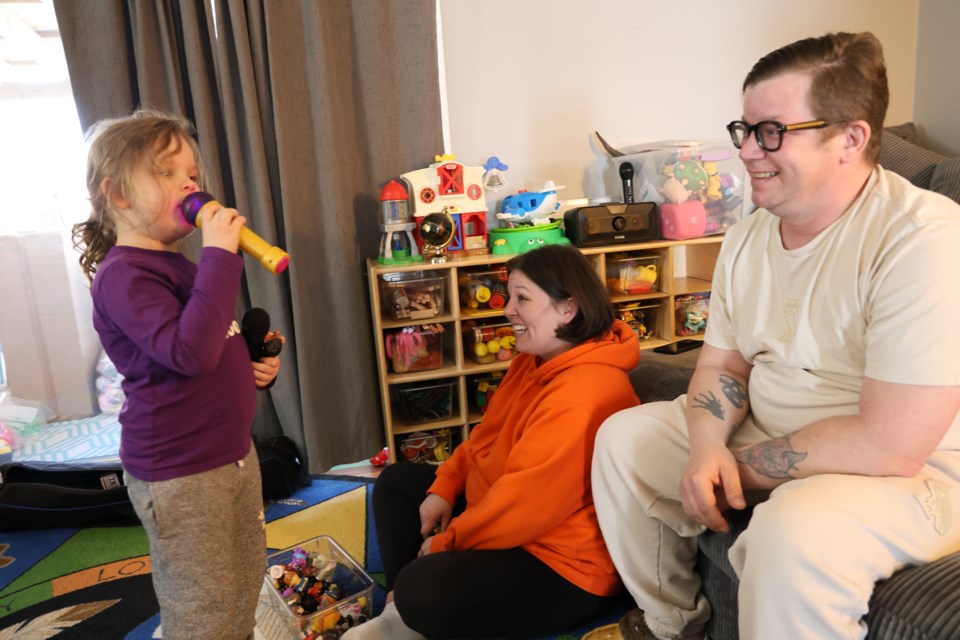THUNDER BAY — Scarlet Cully talks and sings as she plays with her parents on a sunny March afternoon.
Scarlet, aged four, was non-verbal when she was diagnosed with autism in 2023, said her father Patrick Cully.
"We didn’t think we'd ever hear her say the words 'I love you mom, I love you dad,'" said Cully.
He and his wife, Jamie McGinnis, enrolled Scarlet in applied behaviour analysis (ABA) therapy, a type of therapy that experts say betters language and communication skills, among many other benefits.
Scarlet’s parents credit the full-time (40 hours a week) therapy with the huge strides Scarlet has made since she was diagnosed.
“She, at one time, was considered non-verbal, and again, as you hear her now, she's quite verbal,” Cully said. “She loves to sing and she loves to read and, you know, we owe that to ABA.”
“It's been a lovely experience watching her grow into her culture,” said McGinnis — she and Scarlet are from Batchewana First Nation — adding that Scarlet attended a powwow last year, wearing a jingle dress made by her great aunt.
“It was beautiful, because as soon as those drums started and she started bouncing with the drums, I'm like, ‘oh yeah, you got it my girl.’”
Scarlet was making great strides in her development by being in ABA therapy full time, Cully said. Given the cost (over $217,000 annually), she was covered by funding through Jordan’s Principle, a federal human rights principle designed to ensure First Nations children don’t face gaps in service when there is a question of whether Ottawa or the provinces are responsible for paying.
Effectively, it means the federal government, through Indigenous Services Canada, pays for approved treatments and programming up front and, if necessary, settles up with the province in question later. It was named in memory of Jordan River Anderson, a boy from Norway House Cree Nation in Manitoba with multiple disabilities who died in 2005 after living in hospital for over two years while federal and provincial governments argued over who would pay for his home care.
Cully and McGinnis had been receiving Jordan’s Principle funding for Scarlet until they were informed in late March that their latest application was denied after what Cully called a months-long review process. Cully said he had to contact Indigenous Services Canada multiple times to get any kind of response.
“We had exhausted funding in September of 2024 for her current ABA therapy being provided locally,” he said. “And upon our request for an urgent renewal to keep Scarlet rostered at this particular therapist, we received no decision.”
“We had put the request in under an urgent classification due to the impact that being without therapy would potentially have on Scarlet,” he continued.
“As the months rolled on, we went through Christmas and New Year's without any decision as to whether or not we were going be able to keep her in therapy, and we ended up essentially using services without the funding and so accumulating a bill and, in the past, these bills have been settled by the federal government and Indigenous Services Canada.”
That changed with this month’s denial letter, he said, adding that they are appealing the decision.
“If all we can do is give these children a voice and some of the families a voice, I think we're doing the best thing that we can do (which) is to try to bring attention to a situation and a cause that needs a bit of attention,” Cully said.
The severity of Scarlet’s disability precludes her from attending school, Cully said, adding that her specialist recommended 35 to 40 hours of ABA therapy per week. Now, Cully said, all they have access to is Ontario Autism Program funding for two half-days per week.
The letter from Indigenous Services Canada, obtained by Newswatch, said the funding was denied because the department “is not aware of an existing government service that currently provides funding for full-time ABA therapy in lieu of school-based educational supports on behalf of individuals.”
The department argued in its letter that if there isn’t a provincially-funded service, the First Nation child isn’t being discriminated against if Jordan’s Principle funding isn’t approved.
Cully said he’s worried that this is a sign of a “systemic dismantling of a program like Jordan's Principle,” and that “it's left children like Scarlet with huge gaps in service that puts her at risk to potentially regress.”
In February, the department announced changes to "operating procedures to make sure requests align with the long-term sustainability of Jordan’s Principle."
In an email to Newswatch, Indigenous Services Canada spokesperson Jennifer Cooper said the department can't speak further to individual cases, but in general, the department is making changes to Jordan's Principle "to ensure long-term sustainability, keep pace with increased demand and expedite decision-making."
Each new request, she added, will be made on a case-by-case basis and just because requests had been approved before doesn't guarantee approvals of new funding for the same services.
-This story has been updated to include comments from Indigenous Services Canada.
